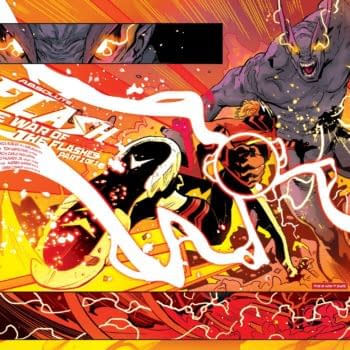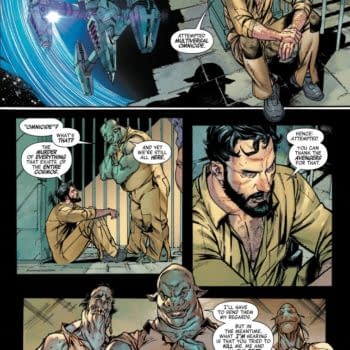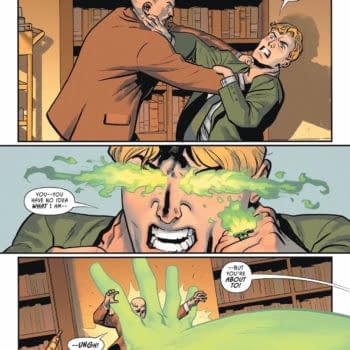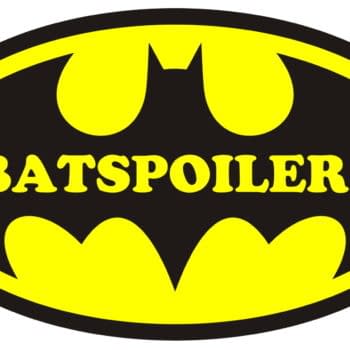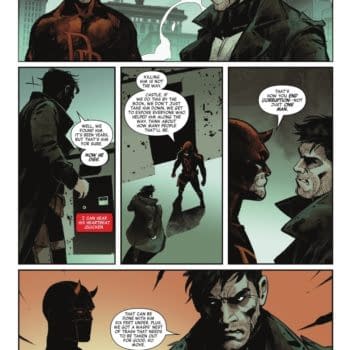Posted in: Comics | Tagged: Battlestar Galactica: Death of Apollo, Comics, dan abnett, dynamite, entertainment
Writer To Writer – Del Col And McCreery Talk To Dan Abnett About The Death Of Apollo
Anthony Del Col and Conor McCreery, writers of Sherlock Holmes vs. Harry Houdini # 3, talk with Dan Abnett about Battlestar Galactica: Death of Apollo #2, both on sale January 14th.

Dan Abnett: I guess it may to a certain extent, because the relaunch was so good. But there's an awful lot of love for the original out there still, as demonstrated by the great response we're getting to this series. The original show had a tone, style and quality all of its own. I guess the biggest shadow falls on me… to make sure I'm channeling the "correct" BSG spirit when I'm writing this.
A&C: For people not familiar with original BSG but fans of the show, what is ONE thing you want them to keep in mind when encountering this story?
DA: Though the situation for the fleet was bleak, the original show had a great optimism, and a vigorous mood. This story, rather dark by the usual measure, is a major turning point for the original continuity. This is a major story. An epic tale.
A&C: This isn't your first time on the deck the Galactica. How is this experience different than the first 12-issue run you did for Dynamite?
DA: It's an extension of that, really. With the 12-issue run, I tried to build up an ongoing story presented in a series of adventures that had character threads running through it, and introduced a few new regular characters to the cast that I could play with (and have the creative freedom to play with, so that all outcomes weren't predictable). This is the biggest story so far, and is self-contained as an epic adventure, but if you know the original series continuity, and have read the 12-issue run up to this, there are a lot of threads that are picked up on. You can read it in its own right, but you can also see it as an extension of what's gone before.

DA: They are all fun. Starbuck is fun, of course, and Apollo is a splendid leading man/hero. Some of the new characters are interesting to play with, like Xam, Madusa and Sephoni. I guess my favorite throughout this and the preceding 12 issues is Athena. She's a major character, but I feel she was often underused. I've tried to show her as a strong, complicated character and a very important and capable member of the main cast.
A&C: You've said you watched BSG as a child. This story is meant to bridge the gap between the original BSG and the 1980 relaunch where Apollo disappeared. Was Apollo's disappearance something you wondered about when you were younger?
DA: I did, though I'm afraid I had drifted away by the time Galactica 1980 came along. But delving into BSG lore to write the original 12 issues, I realized there was a lot that had been left open, unfinished or unexplained, and I wanted to fill in some of those gaps. The disappearance of Apollo is one of the big ones.
A&C: I'm curious at the way you look at psionics and faith? Are they a paired couplet? Or is psionics, despite the "magic" element, scientific? Is it something that can be believed with certainty, as long as you know the rules?

A&C: Can you shed any insight into the relationship between Xam and The Countess and how they communicate? Clearly Xam knows something at the end that the Countess doesn't seem to know? Do they have an open channel between them? Or do you see one as having the upper hand as far as keeping secrets goes?
DA: Both are genuine psionics. The Countess has clearly been misled by Cylon manipulation, which has produced "false reads" in her divination. Xam, simply because of his state, is a genuine mystery. He simply can't explain or communicate beyond the small, short, often enigmatic messages. We know he was immensely powerful, perhaps the most powerful psionic the Colonials have ever known. He can read things that other psionics cannot, perhaps even perceiving aspects of the universe invisible to others. He has a clarity of view, a supreme clarity — but is tragically limited in terms of how he can communicate it.
A&C: Dan, you've written for pretty much everyone, and in every medium. How do you get inspired to keep creating the way you do? Do you ever feel burnt out? And if so, how do you fight that?
DA: I love writing, so the process is seldom a hardship, and I only take jobs where I can see the fun and possibilities involved, otherwise my own disengagement would show. I also find that I produce my best work when I'm under pressure, so having a lot to do is a benefit. It keeps the energy and activity up, and keeps my mind firing. But everyone gets tired at some point: at the end of a long job, or a very busy week, or just when you've been working on the same thing for a long time. And everyone also just has days when it doesn't "flow". I try to step back, do something entirely different, and clear my head. Reading helps a lot. Reading what someone else is doing, fiction, non-fiction. I'm not saying I read to reload with ideas and plagiarize! I just mean, words and stories are like fuel. You need to put some back in your tank to generate new ones of your own.

DA: No, this is all me. Our working relationship ended in 2012. I've always written a great deal on my own — most of my novels, for example, and many comics, though I now very successfully co-write some novel projects with my wife Nik Vincent. Andy and I collaborated on the stuff we both liked, which tended to be U.S. comic books, usually superhero books we'd both read as kids. Even then, though we shared the credit for the sake of simplicity, I was the writer. We'd brainstorm stories together, throw ideas around, but all of the full scripts and all of the dialogue were written by me. Andy's an artist and a highly regarded inker, and his love of comics brought a great enthusiasm to the brainstorming, but he didn't write. The shared credit of DnA was simply a shorthand to avoid more complicated explanations of a curious working arrangement, and I have to admit that it was one of the reasons we stopped doing it. It suggested an equivalency of contribution that simply wasn't true. I would say that I'm all for collaboration, however. It's very, very rewarding (and writing can often be a miserably solitary occupation), and it serves very well, for instance working as part of a creative team on a game, or devising story-telling methods with an artist on a comic. Comics are by their very nature collaborative. I'm very happy writing solo, as me, and taking the credit (and blame!), but I'm always on the phone with the artists I work with, with game design colleagues, and — in the case of something like Warhammer 40,000's hugely successful Horus Heresy novel series — my fellow writers on a large-scale project. Cabin fever and going stir-crazy are the bane of the solitary freelance creative's life, and must be kept at bay! (smiles)
For more on Battlestar Galactica: Death Of Apollo #2, click here.










